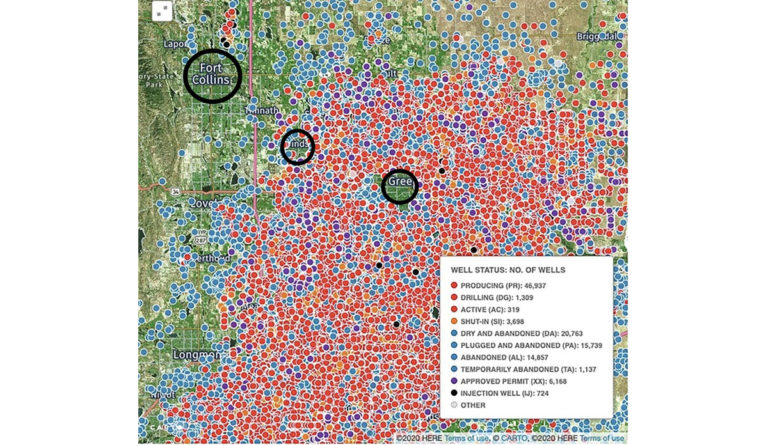Too Close for Comfort
Researchers examined the mental health impacts of non-traditional oil extractions on residents in Colorado.

Read Time: 2 minutes
Published:
In Greeley, Colorado oil rigs loom over grocery stores, schools, and playgrounds. Unconventional oil and gas (UOG) production is a permanent fixture in Colorado’s Front Range. UOG production consists of non-traditional techniques to extract oil including directional drilling, fracking, and oil sands.
UOG production in Colorado has quadrupled in the last 10 years. Supporters of UOG focus on economic benefits including jobs and low gas prices. However, production exposes workers, consumers, and those living nearby to toxins that lead to negative physical health impacts including respiratory conditions, skin irritation, birth defects, and childhood cancer. The mental health impacts are less well known.
Stephanine Malin set out to uncover the mental health impacts of extractions on local residents. As the map shows, the sheer number of oil wells is overwhelming. The red dots indicate the locations of nearly 50,000 active wells. Malin studied stress levels through interviews, focus groups, and biomarker assessments in Greeley, Winsor, and Fort Collins, (shown by the black circles above).
Malin identified UOG production as a chronic environmental stressor. The chronic stress, however, stems not from oil production directly, but from uncertainty and powerlessness. Participants discussed two sources of uncertainty. First, lack of transparency about health and environmental risks leaves citizens wondering how production will affect their lives. Second, production decisions exclude public comments, giving locals no say in where production takes place.
Ninety percent of participants reported increased, chronic stress, and 75% reported longer-term depression due to uncertainty and powerlessness. Those who didn’t report chronic stress or depression lived further away from production sites, were community leaders, or worked for the oil industry. All but 5% of participants felt some uncertainty regarding the impacts of UOG production on public health and the environment.
Malin notes that uncertainty, powerlessness, and inequity are directly tied to local, state, and national policies, and institutional practices. The decisions of governments to promote secrecy and prevent public input directly impact mental health.
Malin, Stephanie A. Depressed democracy, environmental injustice: Exploring the negative mental health implications of unconventional oil and gas production in the United States. Energy research & social science vol. 70 (2020).



